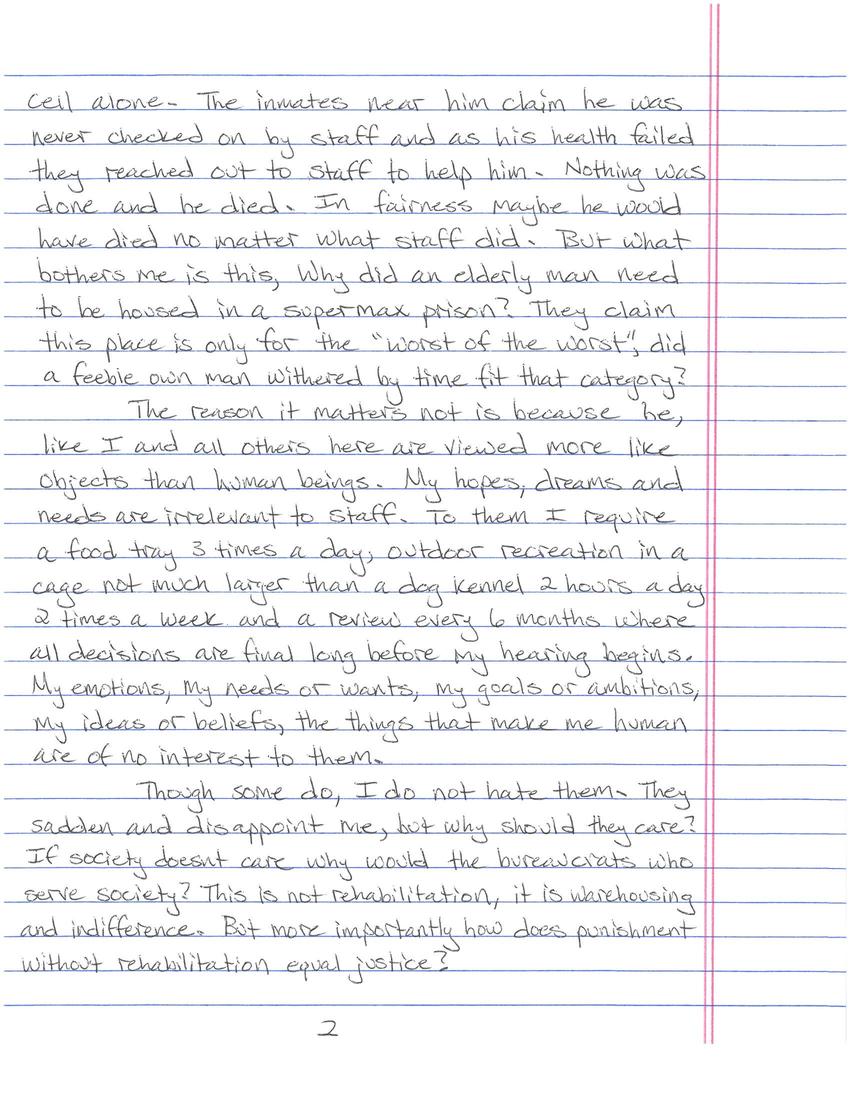
Transcription
Second Blog Post
My eyes have seen a lot inside the federal supermax. I arrived here in February and spent four months in the special housing unit known as Z-Unit. I sometimes wonder if Z, the last letter of the English alphabet, was chosen deliberately to signify the end, the final stop.
Z-Unit housed many tragic persons. One who was so desperate for hope was convinced if only he asserted the government had no jurisdiction over him he'd be free. Another who smeared his own feces on the walls of his cell in a cry for help. And yet many others whose wails of despair and screams of rage never ceased day or night.
Sadly, the man who asserted lack of jurisdiction is still here. And the man who smeared his feces did nothing but provide sick laughter to prison guards and administrators who truly couldn't have cared less. The man who cried and screamed I imagine still does so, even now.
I moved to the general population in June. This means I get a small television in my cell and that's about it. I have not forgotten the men of Z-Unit, and I am haunted by my memories of that miserable place.
A few days ago an elderly man died in his cell alone. The inmates near him claim he was never checked on by staff and, as his health failed, they reached out to staff to help him. Nothing was done and he died. In fairness, maybe he would have died no matter what staff did. But what bothers me is this: why did an elderly man need to be housed in a supermax prison? They claim this place is only for the "worst of the worst." Did a feeble old man withered by time fit that category?
The reason it matters is not because he, like I and others here, are viewed more like objects than human beings. My hopes, dreams and needs are irrelevant to staff. To them, I require a food trap three times a day; outdoor recreation in a cage not much larger than a dog kennel two hours a day, two times a week; and a review every six months where all decisions are final long before my hearing begins. My emotions; my needs or wants; my goals or ambitions; my ideas or beliefs; the things that make me human are of no interest to them.
Though some do, I do not hate them. They sadden and disappoint me, but why should they care? If society doesn't care, why would the bureaucrats who serve society? This is not rehabilitation, it is warehousing and indifference. But more importantly, how does punishment without rehabilitation equal justice?
Other posts by this author
|
2014 mar 11

|
2014 mar 11

|
2014 mar 7

|
2014 mar 7

|
2013 nov 14

|
2013 nov 11

|
More... |



Replies (9)
I encourage you to keep blogging and thank you for all you've written. The corporate run media does not do a good enough job of highlighting the incarceration explosion and we need to hear from people on the inside.
Please take care of yourself.
I really enjoy reading your blogs.
Regardless of the crime, the sensible approach, and the one receiving the least attention in the ‘problem’ of crime, seems to me to be prevention. Or if you prefer, a bottom up rather than the top down approach that is currently used. I’ve taken the time to get to know a number of people who have committed the crime you refer to, within the last few years because I want to know ‘why’ and from there, think about what to do to prevent these crimes from happening where possible. There is often a common thread here. A blog written by Harlan Richards on this site (entitled ‘Life After Murder) articulates this quite well, where he states “those in prison for murder are for the most part normal people who went wrong at some point and ended up in a tragic situation”.
I would rather see the majority of resources re-directed away from imprisoning offenders, and into strengthening communities, families, and our relationships with one another, specifically single parent families. Strengthening & building resources from the ground level whilst offering genuine treatment amongst victims and offenders together; and genuine rehabilitation programs at the other end. It makes sense to me that treating the problem rather than simply locking people away would affect a positive outcome; certainly more positive than the current system. The social security system in the USA is appalling in comparison to here in Australia and as a result of that (I believe) we have a more secure population and a much lower crime rate. We also have other contributing factors such as strict gun laws & a much less competitive society where mateship & supporting one another is a part of who we are. There is no one solution to crime anywhere, but isn’t looking at prevention rather than a cure a good place to start building.
If you speak to anyone of these people sitting in prison for this crime and others, I would be surprised to find out if they themselves hadn't been affected by this same circle of hatred. So you're right, it is those people which need support, because when it's not forthcoming, the result is often - they become the next intake of offenders. It's this element, across the board, which needs to be addressed to affect real change for all.
You said you never considered prisoners were being mis-treated but it is a common thread on this site isn't it. I would hope you keep an open mind, as difficult as that may be considering you're a victim of crime, and learn all you can from this great resource that, I think, we're all priviliged to have.
Nicki
I wonder if these are the same laws my fellow Australian Julian Assange is being dogged by; although in all fairness, he wasn't simply offering information, he was hacking in to databases and sharing it internationally... But I have to ask... Has-the-world-gone-mad!?